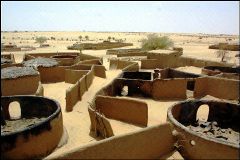UN agreement calls for Sudan to create safe areas in 30 days
By EDITH M. LEDERER, Associated Press Writer
UNITED NATIONS, Aug 07, 2004 (AP) — A new agreement between the United Nations and Sudan requires the government to create safe areas in the crisis-ridden Darfur region within 30 days so civilians can search for food and water and work their land without fear of attack.
 The “Plan of Action for Darfur” would halt all military operations by government forces, militias, and rebel groups in these safe areas, which are likely to be set up in camps where thousands of Sudanese have taken refuge and around towns and villages which still have large populations.
The “Plan of Action for Darfur” would halt all military operations by government forces, militias, and rebel groups in these safe areas, which are likely to be set up in camps where thousands of Sudanese have taken refuge and around towns and villages which still have large populations.
The agreement, which was reached Wednesday night by Sudanese Foreign Minister Mustafa Osman Ismail and U.N. special representative Jan Pronk, “has now been finalized by the Sudanese government,” U.N. spokesman Fred Eckhard said Friday.
It will be signed Monday by the two officials in the Sudanese capital, Khartoum, he said.
Secretary-General Kofi Annan welcomes the agreement and “attaches great importance to substantive and verifiable progress being made during the next 30 days towards restoring full security for the Darfur region,” Eckhard said.
The agreement outlines specific steps that the government of Sudan must take to demonstrate to the U.N. Security Council that it is moving to end the 17-month conflict in the western Darfur region.
The United States estimates that up to 30,000 people have been killed and the United Nations says 1 million people have been forced to flee their homes and an estimated 2.2 million people are in urgent need of food, medicine and shelter. The U.S. Congress and some humanitarian groups have accused Sudan of genocide.
On July 30, the Security Council passed a resolution giving Sudan 30 days to curb pro-government Arab militias known as the Janjaweed, which have been accused of attacking black African farmers in Darfur, and to improve security and humanitarian access.
Otherwise, the council warned that Sudan could face possible diplomatic and economic penalties, which the United States insists will be sanctions.
“Signing agreements and more promises won’t do much for the people on the ground,” said Richard Grenell, spokesman for U.S. Ambassador John Danforth. “What we need is action and that’s what the council will be evaluating in roughly 20 days.”
Under the agreement, the government’s first action must be the creation of safe areas, which would then be linked by secure roads.
“These tasks should be carried out by Sudan police forces to maintain confidence already created by redeployment of (the government’s) armed forces,” the agreement says.
The creation of safe areas will provide a safe haven for those who fled and allow them to search for water and food, take care of animals and work on their land, it says.
To control the activities of the Sudanese armed forces, the agreement calls for a halt to all offensive military operations in the proposed safe areas, including government action against rebel groups.
Under the plan, the government must also “instruct” armed militias “over which it has influence” to halt their activities and lay down their weapons. The government will also ask rebel groups participating in peace talks to immediately halt offensive military operations in the proposed safe areas, in accordance with an April ceasefire agreement.
The agreement also requires the Sudanese government to allow African Union military observers to monitor its performance and to make “an unequivocal declaration of commitment to start the Darfur peace talks as soon as possible” and bring them “to a successful and speedy conclusion.”
